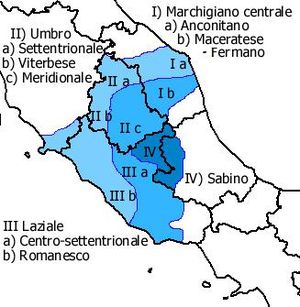- Marchigiano
-
For the Italian wine grape that is also known as Marchigiano, see Verdicchio.
Marchigiano Marchigià Spoken in  Italy
ItalyRegion central Marche (provinces of Ancona, Macerata and Fermo) Native speakers 900,000[citation needed] (date missing) Language family Indo-European- Italic
- Romance
- Italo-Dalmatian
- Central Italian
- Marchigiano
- Central Italian
- Italo-Dalmatian
- Romance
Language codes ISO 639-3 – Linguist List ita-cen Linguasphere 51-AAA-okl & 51-AAA-rba 
This page contains IPA phonetic symbols in Unicode. Without proper rendering support, you may see question marks, boxes, or other symbols instead of Unicode characters. Marchigiano is a Romance language spoken in the region of Marche, in Italy, in a zone which includes the provinces of Ancona, the Macerata's one and the Fermo's one. It is one of the Central Italian dialects, and considered connected to Umbrian dialects and Tuscan much more in the northern part. There are notable grammatical and idiomatic differences between Marchigiano and standard Italian language.
In itself Marchigiano is not uniform from town to town, being divided in three main parts:
- the Ancona's dialect (Anconitano)
- the Fabriano's dialect (Fabrianese)
- the Macerata's dialect (Maceratese).
Contents
Common features
The three areas of the Marchigiano dialect are united by some common features which distinguish the dialect from the others central Italian languages :
- The Italian words stressed on the penultimate syllable which end in no ni or ne suffer the apocope of the last syllable. So the word contadino (farmer) gets contadì, the word piccioni (pigeons) gets picciò, the word cane (dog) gets cà.[1]
- The Italian words which end in -aio change their last syllable in -aro. So the word fornaio (baker) gets fornaro.[1]
- The sound [ʎ] (gli) of the Italian words is changed in a simple [i]. So the word figlio [ˈfiʎːo] (son) gets fìio or fio [ˈfio].
- Generally the final sound -o of the Italian words is changed in -u : fornaio (baker) > fornaru, figlio (son) > fiiu.
- The infinitive of the Italian verbs loses the final sound -re : amare (to love) > amà, mettere (to put) > mette, morire (to die) > morì.[2]
- The group ng suffer from the assimilation in gn : mangiamo (we eat) > magnamo.[2]
- The third-person plural inflection is the same of the singular one. So the word ama can mean he (she, it) loves or they love.[2]
The conjugation of to be and to have got at the present indicative tense in the two main dialects is as follows :
English Anconitano Maceratese Italian I am so so sono you are sai ssi sei he/she/it is è adè è we are semo simo siamo you are sete sete siete they are è(ne) adè sono English Anconitano Maceratese Italian I have got ciò ciò ho you have got ciài ci(ài) hai he/she/it has got cià cià ha we have got ciavémo ciaìmo abbiamo you have got ciavéte ciaéte avete they have got cià(ne) cià hanno Features of the three areas
Ancona's dialect
The dialect of Ancona is spoken in the area included among the town of Ancona, Porto Recanati, Loreto, Osimo, Jesi, Chiaravalle and Falconara. Particularly this dialect's speakers use always the articles el (the male singular, Italian il) unlike standard Italian which in some case uses lo (the male singular). Only the speakers of the town which are closer to Macerata (Osimo, Castelfidardo, Loreto, Porto Recanati) use the article lo like in Italian.[1] These cities also suffer other influences from Macerata's dialect because they're closer to it.[1]
Fabriano's dialect
The dialect of Fabriano is spoken in the town of Fabriano (closer to Umbria) and in the towns closer to it. The rhotacism happens in this dialect (calza (sock) > carza, fulmine (lightning) > furmine).
Macerata's dialect
The dialect of Macerata is spoken in the province of Macerata and in the Fermo's one. The speakers of Macerata,to say the, use lu(male singular) and lo (neuter singular) . The rhotacism happens. A lot of assimilations happens:
- nd > nn : mettendo (putting) > mettenno,
- mb > mm : gamba (leg) > gamma,
- nt > nd : pianta (plant) > pianda,
- mp > mb : campo (field) > cambu,
- ld > ll : caldo (hot) > callu.
Vocabulary
Follows a list of nouns, verbs and other words from Marchigiano : ammò (adv. by this time; now), babbu (n. dad; father), bardasciu or vardasciu (n. boy; child), bedollu or bidullu (n. poplar), brenciu or vrenciu (adj. bitter; sour), ciambottu or ciammottu (n. toad / clumsy), cuscì (adv. in this way),grannola (n. hail), (a)lluccà (vb. to shout; to scream), nnertu (adj. thick), rosciu or rusciu (adj. red), sbisgià or sbiscià (vb. to slide), scì (adv. yes).
See also
- Central Italian
- Tuscan dialect
- Umbrian dialect
- Sabin dialect
- Marche
External links
Notes
Categories:- Language articles with undated speaker data
- Languages with Linglist but no iso3 codes
- Dialects of Italian
- Marche
- Italic
Wikimedia Foundation. 2010.
